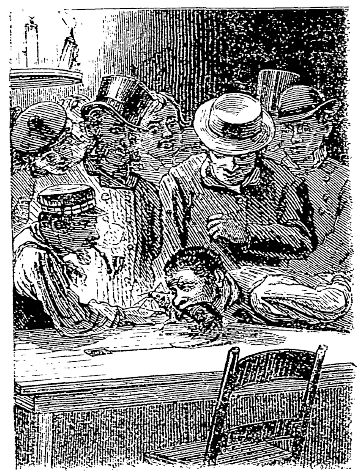
A Human Rat Eater.

An employee of the Boston Gas Works boasted his ability to kill a rat with his teeth.
August 14, 2017

alias: HENDERSON, TITTER
BURGLAR, BUTCHER-CART THIEF
Via Newspapers.comAs I have mentioned a number of times before, some of the damnedest things happen in Wales. The “South Wales Argus,” August 30, 1946:An amazing story of a strange creature, half-man and half-horse, said to be haunting Blaenavon in the early hours of the morning, has been reported in detail to the police at Blaenavon. Mr. William Henry Davies, age 34, a miner at Kays
More...
Strange Company - 2/5/2025
Included in yesterday’s trip to Fall River was a stop at Miss Lizzie’s Coffee shop and a visit to the cellar to see the scene of the tragic demise of the second Mrs. Lawdwick Borden and two of the three little children in 1848. I have been writing about this sad tale since 2010 and had made a previous trip to the cellar some years ago but was unable to get to the spot where the incident occured to get a clear photograph. The tale of Eliza Borden is a very sad, but not uncommon story of post partum depression with a heartrending end. You feel this as you stand in the dark space behind the chimney where Eliza ended her life with a straight razor after dropping 6 month old Holder and his 3 year old sister Eliza Ann into the cellar cistern. Over the years I have found other similar cases, often involving wells and cisterns, and drownings of children followed by suicides of the mothers. These photos show the chimney, cistern pipe, back wall, dirt and brick floor, original floorboards forming the cellar ceiling and what appears to be an original door. To be in the place where this happened is a sobering experience. My thanks to Joe Pereira for allowing us to see and record the place where this sad occurrence unfolded in 1848. R.I.P. Holder, Eliza and Eliza Ann Borden. Visit our Articles section above for more on this story. The coffee shop has won its suit to retain its name and has plans to expand into the shop next door and extend its menu in the near future.
More...
Lizzie Borden: Warps and Wefts - 2/12/2024
Without La Delice Pastry Shop’s swinging 1960s store sign—a visual feast of blue and red, curlycue cursive, and capital letters—the southwest corner of Third Avenue and 27th Street would be just another stretch of Kips Bay. Though the sign looks very midcentury, La Delice (which translates from French as “the delight”) has actually been around […]
More...
Ephemeral New York - 2/3/2025
An article I recently wrote for the British online magazine, New Politic, is now available online. The article, “The Criminal Origins of the United States of America,†is about British convict transportation to America, which took place between the years 1718 and 1775, and is the subject of my book, Bound with an Iron Chain: […]
More...
Early American Crime - 12/17/2021
Robert Kever and William Lowman were walking together on Mississippi Street in Indianapolis around 10:00 the night of January 15, 1880. Without warning, a man jumped from behind a tree and plunged a butcher knife into Kever’s throat. The perpetrator was a butcher named Louis Antenat.“Aha, God damn you, I’ve got you now!” Shouted Antenat, and with one slash of the knife, he severed Kever’s carotid
More...
Murder By Gaslight - 2/1/2025
Soapy STAR notebookPage 15 - Original copy1883Courtesy of Geri Murphy(Click image to enlarge)
OAPY SMITH IN DENVER, WISCONSIN AND MINNESOTA.This is page 15, dated July-September 1883, the continuation of deciphering Soapy Smith's "star" notebook from the Geri Murphy's collection. A complete introduction to this notebook can be seen on page 1. These notebook pages
More...
Soapy Smith's Soap Box - 1/29/2025
Youth With Executioner by Nuremberg native Albrecht Dürer … although it’s dated to 1493, which was during a period of several years when Dürer worked abroad. November 13 [1617]. Burnt alive here a miller of Manberna, who however was lately … Continue reading
More...














